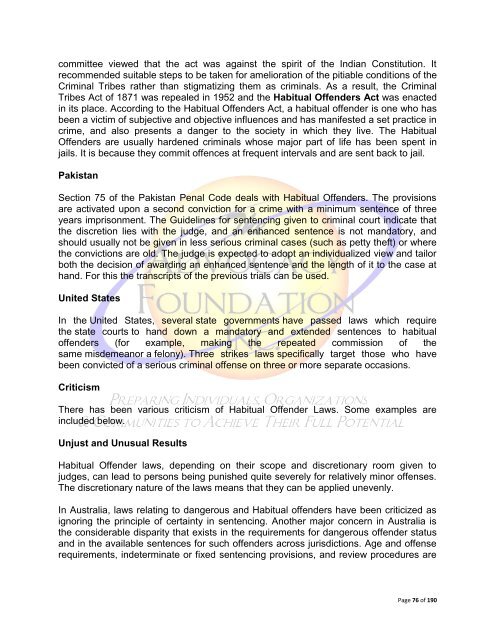The Violent Crime and Law Enforcement Act of 1994
The Violent Crime and Law Enforcement Act of 1994
The Violent Crime and Law Enforcement Act of 1994
You also want an ePaper? Increase the reach of your titles
YUMPU automatically turns print PDFs into web optimized ePapers that Google loves.
committee viewed that the act was against the spirit <strong>of</strong> the Indian Constitution. It<br />
recommended suitable steps to be taken for amelioration <strong>of</strong> the pitiable conditions <strong>of</strong> the<br />
Criminal Tribes rather than stigmatizing them as criminals. As a result, the Criminal<br />
Tribes <strong>Act</strong> <strong>of</strong> 1871 was repealed in 1952 <strong>and</strong> the Habitual Offenders <strong>Act</strong> was enacted<br />
in its place. According to the Habitual Offenders <strong>Act</strong>, a habitual <strong>of</strong>fender is one who has<br />
been a victim <strong>of</strong> subjective <strong>and</strong> objective influences <strong>and</strong> has manifested a set practice in<br />
crime, <strong>and</strong> also presents a danger to the society in which they live. <strong>The</strong> Habitual<br />
Offenders are usually hardened criminals whose major part <strong>of</strong> life has been spent in<br />
jails. It is because they commit <strong>of</strong>fences at frequent intervals <strong>and</strong> are sent back to jail.<br />
Pakistan<br />
Section 75 <strong>of</strong> the Pakistan Penal Code deals with Habitual Offenders. <strong>The</strong> provisions<br />
are activated upon a second conviction for a crime with a minimum sentence <strong>of</strong> three<br />
years imprisonment. <strong>The</strong> Guidelines for sentencing given to criminal court indicate that<br />
the discretion lies with the judge, <strong>and</strong> an enhanced sentence is not m<strong>and</strong>atory, <strong>and</strong><br />
should usually not be given in less serious criminal cases (such as petty theft) or where<br />
the convictions are old. <strong>The</strong> judge is expected to adopt an individualized view <strong>and</strong> tailor<br />
both the decision <strong>of</strong> awarding an enhanced sentence <strong>and</strong> the length <strong>of</strong> it to the case at<br />
h<strong>and</strong>. For this the transcripts <strong>of</strong> the previous trials can be used.<br />
United States<br />
In the United States, several state governments have passed laws which require<br />
the state courts to h<strong>and</strong> down a m<strong>and</strong>atory <strong>and</strong> extended sentences to habitual<br />
<strong>of</strong>fenders (for example, making the repeated commission <strong>of</strong> the<br />
same misdemeanor a felony). Three strikes laws specifically target those who have<br />
been convicted <strong>of</strong> a serious criminal <strong>of</strong>fense on three or more separate occasions.<br />
Criticism<br />
<strong>The</strong>re has been various criticism <strong>of</strong> Habitual Offender <strong>Law</strong>s. Some examples are<br />
included below.<br />
Unjust <strong>and</strong> Unusual Results<br />
Habitual Offender laws, depending on their scope <strong>and</strong> discretionary room given to<br />
judges, can lead to persons being punished quite severely for relatively minor <strong>of</strong>fenses.<br />
<strong>The</strong> discretionary nature <strong>of</strong> the laws means that they can be applied unevenly.<br />
In Australia, laws relating to dangerous <strong>and</strong> Habitual <strong>of</strong>fenders have been criticized as<br />
ignoring the principle <strong>of</strong> certainty in sentencing. Another major concern in Australia is<br />
the considerable disparity that exists in the requirements for dangerous <strong>of</strong>fender status<br />
<strong>and</strong> in the available sentences for such <strong>of</strong>fenders across jurisdictions. Age <strong>and</strong> <strong>of</strong>fense<br />
requirements, indeterminate or fixed sentencing provisions, <strong>and</strong> review procedures are<br />
Page 76 <strong>of</strong> 190
















